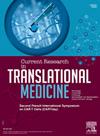CRISPR-Cas9: a prominent genome editing tool in the management of inherited blood disorders and hematological malignancies
IF 3
4区 医学
Q2 MEDICINE, RESEARCH & EXPERIMENTAL
引用次数: 0
Abstract
Several hematologic diseases with genetic defects, like sickle cell disease and β-thalassemia can be treated with allogeneic hematopoietic stem cell transplantation (HSCT) from healthy donors. However, suitable tissue-matched donors are often unavailable, and HSCT involves risks such as graft-versus-host disease and potential disease relapse. Due to the genetic heterogeneity of blood disorders and the complexity of the hematopoietic system, identifying effective genes for managing and treating both benign and malignant conditions remains a significant challenge. The genome editing field is rapidly expanding and is essential for identifying genetic factors in pathological processes. These developments highlight the importance of using ex vivo gene therapy approaches for autologous hematopoietic stem cells. Also, gene editing technologies are gaining significant interest in engineered cell therapies for hematological malignancies . Today, various programmable nucleases are available for genome editing, with the clustered regularly interspaced short palindromic repeats (CRISPR)-CRISPR-associated protein 9 (Cas9) system standing out due to its high efficiency, low cytotoxicity, cost-effectiveness, and precision. This system can serve as a genomic modification tool for treating blood disorders, including hereditary diseases and immunotherapy for cancer using chimeric antigen receptor T cells (CAR-T cells). Advancements in CRISPR-Cas9 are expected to significantly impact medical research and clinical applications. However, challenges such as off-target effects and immunogenicity must be addressed. This review summarizes the mechanism and delivery strategies of CRISPR-Cas9, discusses its applications in treating inherited blood disorders such as sickle cell disease, β-thalassemia, and fanconi anemia, as well as hematological malignancies, and highlights the associated challenges.

CRISPR-Cas9:在遗传性血液疾病和血液系统恶性肿瘤的管理突出的基因组编辑工具
一些具有遗传缺陷的血液病,如镰状细胞病和β-地中海贫血,可以通过健康供体的同种异体造血干细胞移植(HSCT)治疗。然而,合适的组织匹配供体往往是不可用的,并且移植涉及移植物抗宿主病和潜在的疾病复发等风险。由于血液疾病的遗传异质性和造血系统的复杂性,确定有效的基因来管理和治疗良性和恶性疾病仍然是一个重大的挑战。基因组编辑领域正在迅速扩大,对于识别病理过程中的遗传因素至关重要。这些进展突出了使用体外基因治疗方法治疗自体造血干细胞的重要性。此外,基因编辑技术在血液恶性肿瘤的工程细胞疗法中也引起了极大的兴趣。如今,各种可编程核酸酶可用于基因组编辑,聚集规律间隔短回文重复序列(CRISPR)-CRISPR相关蛋白9 (Cas9)系统因其高效率、低细胞毒性、成本效益和准确性而脱颖而出。该系统可以作为治疗血液疾病的基因组修饰工具,包括遗传性疾病和使用嵌合抗原受体T细胞(CAR-T细胞)进行癌症免疫治疗。CRISPR-Cas9的进展有望对医学研究和临床应用产生重大影响。然而,必须解决脱靶效应和免疫原性等挑战。本文综述了CRISPR-Cas9的机制和传递策略,讨论了其在镰状细胞病、β-地中海贫血、范可尼贫血等遗传性血液疾病以及血液系统恶性肿瘤治疗中的应用,并指出了相关挑战。
本文章由计算机程序翻译,如有差异,请以英文原文为准。
求助全文
约1分钟内获得全文
求助全文
来源期刊

Current Research in Translational Medicine
Biochemistry, Genetics and Molecular Biology-General Biochemistry,Genetics and Molecular Biology
CiteScore
7.00
自引率
4.90%
发文量
51
审稿时长
45 days
期刊介绍:
Current Research in Translational Medicine is a peer-reviewed journal, publishing worldwide clinical and basic research in the field of hematology, immunology, infectiology, hematopoietic cell transplantation, and cellular and gene therapy. The journal considers for publication English-language editorials, original articles, reviews, and short reports including case-reports. Contributions are intended to draw attention to experimental medicine and translational research. Current Research in Translational Medicine periodically publishes thematic issues and is indexed in all major international databases (2017 Impact Factor is 1.9).
Core areas covered in Current Research in Translational Medicine are:
Hematology,
Immunology,
Infectiology,
Hematopoietic,
Cell Transplantation,
Cellular and Gene Therapy.
 求助内容:
求助内容: 应助结果提醒方式:
应助结果提醒方式:


